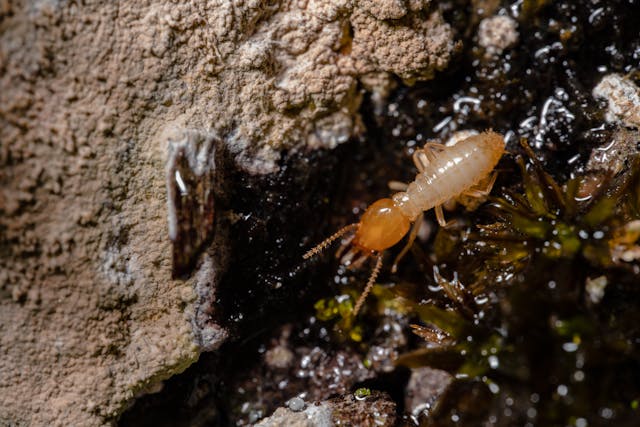Key Takeaways
- Peak Activity: Termite activity intensifies during warmer months, particularly from spring to summer, influenced by temperature, humidity, and species.
- Seasonal Behavior: Subterranean termites typically swarm during daylight after warm rainfalls, while drywood termites swarm from late summer to early fall, often in the late afternoon or evening.
- Year-Round Vigilance: Despite reduced activity in colder months, termites can persist in heated structures year-round, necessitating continuous preventive measures.
- Optimal Treatment Timing: Early spring is ideal for termite treatments to disrupt colony establishment before peak activity.
- Preventive Measures: Regular inspections, moisture control, sealing entry points, yard maintenance, and preventive treatments are crucial in safeguarding homes against termite infestations.
Termites pose a significant threat to homes and structures, with their activity peaking during warmer seasons. Understanding these patterns is essential for effective prevention and control.
When Do Termites Peak in Activity?
Termites are most active during warmer periods, typically from spring to summer. However, their activity levels are influenced by various factors, including temperature, humidity, and species-specific behaviors.
Subterranean Termites
Subterranean termites are known to swarm during daylight hours, especially following warm rainfall. These termites build mud tubes to access above-ground food sources and are highly sensitive to moisture levels. Their swarming activity is a key indicator of colony expansion and potential infestations.
Drywood Termites
Drywood termites, on the other hand, swarm from late summer to early fall, often in the late afternoon or evening. Unlike their subterranean counterparts, drywood termites do not require contact with soil moisture and can infest dry wood, including structural timber and furniture. Their ability to thrive in drier conditions makes them particularly insidious, as infestations can go unnoticed until significant damage has occurred.
Seasonal Cycle of Termite Activity
Termite activity follows a seasonal cycle, although this can vary based on geographic location and local climate conditions:
- Spring (March to May): This period marks the onset of swarming for many termite species as they seek to establish new colonies. The combination of warming temperatures and increased humidity creates optimal conditions for reproductive termites to disperse and mate.
- Summer: In regions with high humidity, termite activity remains elevated. During this time, termites focus on expanding their colonies and foraging for food, leading to increased potential for structural damage.
- Fall: As temperatures begin to cool, termite activity gradually decreases. However, in milder climates, termites may remain active well into the fall, continuing to pose a threat to structures.
- Winter: In colder regions, termite activity significantly diminishes as they retreat deeper into the soil to escape low temperatures. Nevertheless, in warmer climates or heated structures, termites can remain active throughout the year, necessitating continuous vigilance.
Termite Control Throughout the Year
Effective termite control requires a year-round approach, with strategies tailored to each season:
- Spring: Conduct thorough inspections for signs of swarming, such as discarded wings and mud tubes. Engage professional pest control services to assess and treat any detected infestations promptly.
- Summer: Maintain vigilance by monitoring for signs of termite activity. Ensure that your home remains dry and well-ventilated, as termites are attracted to moisture-rich environments.
- Fall: Perform comprehensive inspections to identify and address any lingering termite activity. Repair structural weaknesses, such as cracks in the foundation or gaps in siding, that could serve as entry points for termites.
- Winter: Utilize this period of reduced termite activity to bolster your home’s defenses. Implement preventative treatments that will be most effective in the upcoming spring, and address any moisture issues that could attract termites.
When Should You Spray for Termites?
Early spring, around March or April, is considered the optimal time to apply termite treatments. Treating during this period can eliminate colonies before they reach peak activity levels, effectively disrupting swarming and the establishment of new colonies. However, if signs of termites are detected at any time of the year, immediate action is crucial to prevent further damage.
5 Tips to Prepare for Termite Season
- Schedule a Professional Inspection: Arrange for a licensed pest control professional to inspect your home in early spring. Early detection of termite activity allows for timely intervention and treatment.
- Eliminate Moisture Sources: Termites are attracted to moisture. Repair any leaks, ensure proper drainage around your home’s foundation, and use dehumidifiers in damp areas such as basements and crawl spaces.
- Seal Entry Points: Inspect your home for cracks, gaps, and other openings in walls, foundations, and roofs. Seal these potential entry points to prevent termites from gaining access.
- Maintain Your Yard: Keep mulch, woodpiles, and landscaping materials away from your home’s foundation. Trim vegetation and ensure proper ventilation around your residence to reduce moisture buildup.
- Use Preventative Treatments: Consider applying preventative measures such as soil treatments or bait stations around your home’s perimeter. Products like the Sentricon Termite Colony Elimination System have been effective in eliminating termite colonies by utilizing bait stations that worker termites carry back to their nests, leading to colony-wide eradication.
Conclusion
Understanding the seasonal fluctuations in termite activity enhances your ability to protect your home from these destructive pests. By maintaining vigilance and implementing year-round control measures, you can minimize the risk of termite-induced damage. While spring demands particular attention for inspections and treatments, consistent maintenance of your defenses is paramount. Dealing with a pest problem? Our comprehensive treatment solutions will eliminate unwanted pests for good! Contact Escondido Pest Control





